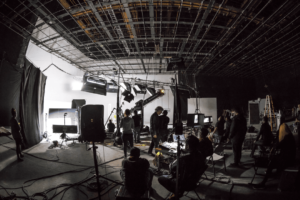Renting a movie theater involves reserving an entire cinema venue for a specific date and time, typically for a private screening or a special event. This allows individuals, groups, or organizations to enjoy a film on the big screen in a more exclusive and controlled environment. Discover pricing insights for a memorable cinematic experience.

Rental options may include bringing your content, such as a personal film or presentation, or selecting from the theater’s current movie offerings. It’s a popular choice for birthday parties, corporate presentations, film premieres, and other occasions where privacy, a large screen, and comfortable seating are desired. Rental costs vary based on location, the movie being screened, and additional services like catering or exclusive access to facilities.
Why Should One Rent a Movie Theatre?
Renting a movie theater can offer several compelling advantages and reasons why individuals or groups might choose to do so:
Privacy
Renting a movie theater provides a private and exclusive viewing experience. You won’t have to share the theater with strangers, allowing you to enjoy the film or event with your selected guests in a more intimate setting.
Big Screen Experience
Movie theaters have large screens and high-quality audio systems that provide a superior audiovisual experience compared to home setups. Renting a theater allows you to enjoy your favorite films, sports events, or presentations on a much larger scale.
Special Occasions
Movie theaters are ideal venues for celebrating special occasions like birthdays, anniversaries, proposals, or even corporate events. They offer a unique and memorable backdrop for such moments.
Exclusive Events
Renting a theater allows you to host exclusive events like film premieres, private screenings, or product launches. It provides an impressive setting for showcasing your content or products.
Control Over Content
You can choose the content you want to screen. Whether it’s a classic movie, a personal film project, a video game tournament, or a live-streamed event, you can curate the experience to suit your preferences.
Comfort and Amenities
Movie theaters often provide comfortable seating, concessions, and amenities like restrooms, enhancing the viewing experience. Some theaters offer additional services such as catering or special event planning.
Avoiding Crowds
If you prefer to watch a popular film without the distractions and potential crowds of a regular cinema, renting a theater allows you to enjoy the film in a more relaxed and controlled environment.

Safety and Health
Particularly during times of public health concerns, renting a private theater can provide peace of mind, as you have control over the guest list and can enforce safety protocols as needed.
Community or Fundraising Events
Organizations, schools, and community groups often rent theaters for fundraisers, educational screenings, or community gatherings, using the opportunity to engage with their audience uniquely.
Unique Entertainment
It’s an excellent way to treat employees, clients, or friends to a special entertainment experience beyond the typical dinner or event venue.
Overall, renting a movie theater offers a blend of exclusivity, comfort, and entertainment that can make various occasions more memorable and enjoyable. It allows you to create a customized cinematic experience that suits your preferences and objectives.
How to Rent a Movie Theatre?
Securing a movie theater room for rental can be a simple procedure, though the particulars may differ based on the theater chain, location, and availability. Here are some basic steps to assist you:
Choose a Theater
Decide on the theater you’d like to rent. You can choose a local independent cinema or check with larger theater chains that offer private screening options.
Contact the Theater
Contact the theater’s management or events coordinator. You can typically find contact information on the theater’s website or by calling their box office. Be prepared to provide details about your event, such as the date, time, the number of attendees, and the purpose of the rental.

Discuss Options
Inquire about the theater’s rental options and packages. The theater may offer different rental packages with varying costs and amenities. Discuss your specific needs, such as whether you’ll be screening a film, hosting a presentation, or planning a special event.
Select a Film or Content
If you plan to screen a movie, check with the theater to see if they have the film you want to show in their library. You may need to obtain the necessary rights and licenses for public screenings of copyrighted films.
Confirm Pricing
Understand the rental fees, any additional costs (such as concessions or catering), and payment terms. Discuss any discounts or package deals that may be available for your event.
Reserve the Date and Time
Once you’ve agreed on the terms, reserve the date and time for your event. Be sure to ask about the theater’s cancellation policy and any deposit requirements.
Discuss Equipment and Setup
If your event requires specific equipment, such as microphones, projectors, or special seating arrangements, discuss these details with the theater’s staff. Ensure that technical aspects are addressed to avoid any issues on the day of your event.
Finalize Details
As the event date approaches, confirm all details with the theater, including start times, access to the theater, and any specific instructions for your event.
Promote Your Event
If your event is open to the public or a specific audience, promote it through marketing and invitations to ensure a good turnout.
Coordinate Logistics
On the day of your event, arrive early to set up, coordinate with the theater staff, and ensure that everything runs smoothly.
Enjoy Your Event
Once everything is in place, sit back and enjoy your movie screening, presentation, or special event in the private theater room.
What Are the Types of Movie Theater Rooms?
Movie theater rooms come in various types, each designed to offer a unique cinematic experience to suit different preferences and needs. Here are some common types of movie theater rooms:
Standard Auditoriums
These are the traditional movie theater rooms with rows of seats facing a large screen. They are equipped with standard projection and audio systems, making them suitable for regular movie screenings.
IMAX Theaters
IMAX theaters feature significantly larger screens and enhanced audio systems, providing an immersive and high-resolution viewing experience. IMAX is known for its breathtaking visuals and immersive sound.
3D Theaters
These theaters have 3D projection systems and use special glasses to create a three-dimensional viewing experience. They are often used for the release of 3D films, adding depth and realism to the visuals.
VIP or Luxury Theaters
VIP or luxury theaters offer a premium movie experience. They feature spacious and comfortable seating, often with recliners, and may include amenities like in-seat dining, waitstaff service, and a more upscale atmosphere.
Drive-In Theaters
Drive-in theaters allow viewers to watch movies from the comfort of their vehicles. A large outdoor screen and audio broadcast through FM radio make drive-in theaters a nostalgic and family-friendly option.
Dine-In Theaters
Dine-in theaters seamlessly merge dining and entertainment, providing a menu with diverse food and beverage choices that can be ordered and served to your seat while enjoying the film. These theaters typically include plush recliners and convenient tables for patrons.
Specialty Theaters
Some theaters specialize in unique or niche experiences. For example, some theaters focus on classic films, independent cinema, art-house films, or cult classics. These venues cater to specific film enthusiast communities.
Screening Rooms
Screening rooms are smaller, private theaters often used for industry screenings, film festivals, and private events. They provide an intimate setting for smaller audiences.
Large-Format Theaters
Apart from IMAX, other large-format theaters like Dolby Cinema and ScreenX offer enhanced visuals and immersive sound to create an exceptional cinematic experience.
Cineplex or Multiplex Theaters
These theaters have multiple screens under one roof, allowing viewers to choose from various films. They offer different sizes and types of auditoriums to accommodate various audiences and movie genres.
Outdoor Cinemas
Outdoor cinemas are set up in open-air locations like parks or rooftops. They often use inflatable screens and provide a unique experience of watching films under the stars.
Microcinemas
Microcinemas are tiny, independently operated theaters with limited seating. They are often dedicated to showcasing independent or niche films in an intimate setting.
The type of movie theater room you choose can significantly impact your viewing experience. Whether you prefer a standard theater for a blockbuster movie, a luxury theater for a premium experience, or a specialty theater for a unique film genre, there are options to cater to various tastes and preferences.
How Much Does it Cost to Rent a Movie Theater?
Renting a movie theater’s cost fluctuates significantly, contingent on various elements. These encompass the theater’s location, the room’s dimensions and type, the rental’s timing and day, the particular movie or content you wish to screen, and any supplementary amenities or services. Here are key points to contemplate:
Size and Type of Theater
The size and type of theater room you choose will impact the cost. Luxury or VIP theaters with premium amenities typically have higher rental fees than standard auditoriums.
Day and Time
Peak times, such as weekend evenings, are often more expensive to rent than weekdays or matinee times. Weekdays and off-peak hours may offer more affordable rates.
Movie Selection
If you plan to screen a specific film, the cost may include licensing fees for public screenings. The price can vary depending on the movie’s popularity and how recently it was released.
Additional Services
Some theaters offer additional services, such as catering, concessions, and technical support, for an extra fee. These supplementary services can contribute to the total rental cost.
Duration of Rental
The length of your rental period is another factor that impacts the cost. Generally, shorter rental durations are more cost-effective than longer ones.
Group Size
Some theaters base their pricing on the number of attendees. Larger groups may incur higher fees.
Special Packages
Some theaters offer special rental packages for events like birthdays, corporate gatherings, or private screenings. These packages may include specific amenities at a set price.
The rental cost of a movie theater is significantly influenced by its location. Major cities and regions often feature higher rental rates for movie theaters than smaller towns and locales.
Is it Easy to Rent a Movie Theatre?
Renting a movie theater can vary in ease depending on factors such as the theater’s location, availability, and the specific requirements of your event. Renting a movie theater is a straightforward process, but it may involve some planning and coordination. Here are some considerations to keep in mind:
Availability
Movie theater rentals can vary based on the theater’s schedule and existing bookings. Popular theaters or specific dates may require booking well in advance, especially for special events.
Contacting the Theater
Contact the theater’s management or events coordinator to inquire about rental options. Contact information is usually available on the theater’s website or by calling their box office.
Event Details
Be prepared to provide details about your event, such as the date, time, estimated number of attendees, and the purpose of the rental (e.g., private screening, special event, presentation).
Rental Packages
The theater may offer different rental packages with varying costs and amenities. Engage in a discussion about your unique requirements and preferences to identify a package that aligns perfectly with your event.
Content Selection
If you plan to screen a specific film, check if the theater has the movie in its library. You may need to obtain the necessary rights and licenses for public screenings of copyrighted films.
Pricing and Payment
Understand the rental fees, any additional costs (such as concessions or catering), and payment terms. Some theaters may require a deposit to secure the booking.
Technical Requirements
If your event requires specific equipment, such as microphones, projectors, or custom setups, discuss these technical requirements with the theater’s staff to ensure everything is in place.
Confirmation and Contracts
Once you’ve agreed on the terms and details, you may need to sign a rental agreement or contract. This document outlines the specifics of your rental, including responsibilities, fees, and any restrictions.
Promotion and Invitations
If your event is open to the public or specific guests, consider how you will promote it and issue invitations or tickets.
Day of the Event
On the day of your event, arrive early to set up, coordinate with the theater staff, and ensure that everything runs smoothly.
Videos
How to Rent the entire AMC Movie Theater for $99 during the Pandemic | Private Theater Rental
I Rented An Entire Movie Theatre To Watch Back To The Future By Myself – Empty AMC Unique Experience
How to rent a PRIVATE movie theater 🍿🎥













